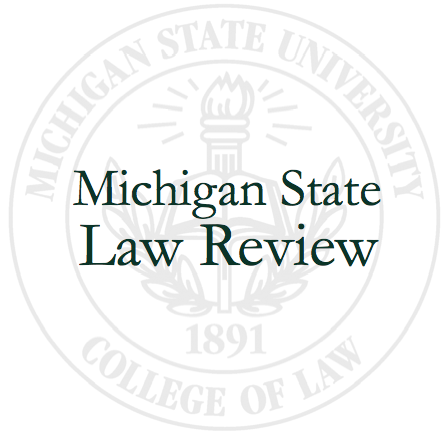Fall 2015: Legal Quanta
Hosted by Michigan State University College of Law Professor James M. Chen, this symposium explored the quantitative analysis of the law. Scholars discussed the need and possibility of an infusion of new methodological energy that may better answer questions that cannot be answered by other methods. The symposium demonstrated a few techniques beyond the most commonly deployed forms of quantitative analysis in law and demonstrated how those techniques could be used to study and predict the law.
Read Volume 2016’s Symposium Articles here.
Schedule of Events
October 29, 2015
9:00 a.m.
9:30 a.m.
J.J. Prescott, Professor of Law, University of Michigan Law School
As a result of limited empirical evidence and controversial anecdotes, speculation over the ubiquity and importance of covenants not to compete is rampant. Professor Prescott presented a simple equilibrium framework to account for the existence and incidence of noncompetition agreements, populate this framework using data from an extensive new survey, and discuss the survey's findings and their potential implications for policy makers considering avenues of reform.
Seth Chandler, Foundation Professor of Law, University of Houston Law Center
Ted Sichelman, Professor of Law, University of San Diego School of Law
Many scholars have employed the term "entropy" in the context of law and legal systems to roughly refer to the amount of "uncertainty" present in a given law, doctrine, or legal system. Just a few of these scholars have attempted to formulate a quantitative definition of legal entropy, and none have provided a precise formula usable across a variety of legal contexts. Here, Professor Sichelman provides such a formula, relying upon Claude Shannon's definition of entropy in the context of information theory. Professor Sichelman applies this approach to offer a more comprehensive account of the uses and limits of "modularity" in the law - namely, in the terminology of Henry Smith, the use of legal "boundaries" that "economize on information costs" by "hiding" classes of information "behind" those boundaries.
11:00 a.m.
L. Thorne McCarty, Professor of Computer Science and Law Rutgers, The State University of New Jersey
In a pair of papers from 1995 and 1997, Professor McCarty developed a computational theory of legal argument, but left open a question about the key concept of a "prototype." This paper proposes a mathematical answer to that question, based on contemporary developments in "manifold learning" and "deep learning," two subfields of machine learning.
12:30 p.m.
James M. Chen, Justin Smith Morrill Chair in Law, Professor of Law, Michigan State University College of Law
Ryan Whalen, JD/PhD Candidate at Northwestern University
The adoption of a “network perspective” has been one of the most influential recent developments in the biological, physical and social sciences. Legal scholars have themselves begun to take a network approach, posing legal questions as network problems and exploring legal data from a network perspective. This presentation reviews the existing literature on legal network analysis, suggests directions for future work, and notes some important caveats for scholars hoping to adopt network analytic methods.
2:00 p.m.
Ryan Black, Associate Professor, Department of Political Science, Michigan State University & Ryan Owens, Professor of Political Science, University of Wisconsin-Madison
Professor Black and Professor Owens discussed whether attorneys who formerly worked for the Office of the Solicitor General are more likely to win their cases than other attorneys. Does past practice in the OSG lead to heightened victory?
Justin Wedeking, Associate Professor, Department of Political Science, University of Kentucky
Traditional measures of expertise assume the domain space of the expert is stable. However, unlike domains such as music, tennis or chess, the legal domain, like many others, is dynamic and becoming increasingly complex. This means traditional measures of expertise will not be sufficient to accurately assess the success with which individuals write legal opinions and make legal policy. Instead, a new, dynamic measure of expertise is necessary for the legal domain, and we leverage the text of U.S. Supreme Court opinions and treat text as data to examine network properties that indicate the degree of expertise that justices develop.
3:45 p.m.
Josh Blackman, Associate Professor of Law, South Texas College of Law
Professor Blackmun's talk focused on the interaction of crowds and data to generate predictions about how courts decide cases.
5:15 p.m.
Closing Remarks by James M. Chen, Justin Smith Morrill Chair in Law, Professor of Law, Michigan State University College of Law
